Christian Products Expo 2019 Lessons
I attended the Christian Products Expo in Murpheesboro, Tennessee between the 25th and 27th of August, 2019, that is, Sunday through Tuesday this week. This meeting is now probably the biggest trade show exclusively for Christian bookstores in the world. I gathered some impressions which I’ll share here about the market this expo serves, what’s going on there, and what that means for speculative fiction books.
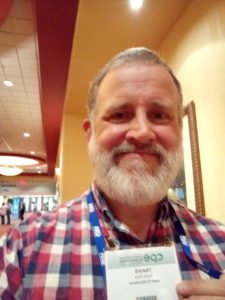
Me showing off my CPE badge (NOT IN MIRROR IMAGE IN REAL LIFE–at least, I certainly hope not! 🙂 )
First, let me mention that “CBA” (Christian Booksellers Association) used to be the shorthand to refer to Christian Bookstores in general and the term “ABA” (American Booksellers Association) was shorthand for the general, non-Christian market. Though in reality, a number of ABA stores like Barnes & Noble sell a pile of Christian books, as do “big box” stores like Walmart. But those stores exclusively dedicated to Christian content, the CBA, has changed. The CBA folded–it no longer exists–but independent Christian bookstores still do exist, so who represents them now? The Christian bookstore market is probably best represented by the Munce Group, who are the people who put on the annual Christian Products Expo that I attended. (Note that agent and Christian market insider Steve Laube mentions the situation with the CBA states who sells Christian books now in a blog post of his I’m linking here.)
Note that I attended the CPE because I have a book I published that I imagined would be in demand by Christian bookstores–Beatitudes and Woes, which has speculative fiction stories linked to Bible passages (I thought the Bible passages would make this a natural for Christian retailers). Note also I had never attended a trade show like this before, that furthermore I was not all that familiar with what was going on with Christian bookstores, and even moreso I am not from the Bible Belt and wasn’t as knowledgeable about the United States sub-culture of Evangelical Christianity that supports these stores as I am now. So some of my observations and thoughts may be in the category of “old news” for many readers of this article. If so, sorry about that, but I’m going to share my thoughts anyway, because it may be other people are like me and didn’t know all that much. (Note my observations are my own and may not always be correct–I’m don’t wish to be a “unreliable narrator” and will mention when I’m only reporting impressions as opposed to facts, but of course my observations are inherently limited by my own perspective.)
Note also that I never have been a member of an association of Christian authors like the ACFW (American Christian Fiction Writers) other than Realm Makers and in fact interacted with the CPE as an author to a degree but more importantly as a small publisher. So the gatekeepers like ACFW have never been hugely important to me. I’ve been a creative indie who does what I want and then tries to sell it rather than caring about what market might exist for what I do. Though I’m shifting from that position to a degree…so this is my first real look at Christian retail buyers of books, though some of my observations may parallel what people have already said based on association with the ACFW and other organizations.
The retail market for Christian books is not dying, as Steve Laube mentions in another of his blog posts. And as was mentioned in a “Market Update” session at the CPE, the sale of e-books is leveling off across the entire book market. The novelty of buying e-books is wearing off for people and the fact that most people in the USA and tech-developed world are plugged into electronic devices all day means that most people have come to see reading for pleasure (as opposed to reading for work) as something linked to a physical book. Books have come to be associated with being unplugged from the world of devices–and holding a book is a tactile pleasure that people enjoy when they really want to spend time in a particular story. Yes, you can get your physical book from the world of online retailers like Amazon and many people do so, but for some book buyers, going into the store to look at and touch the physical book you want to own is very important. And that probably will never go away.
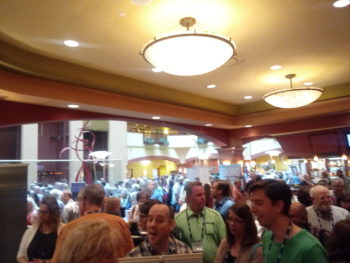
Authors giving away books to Christian retailers on Sunday night–a massive crowd looking for new books.
But are Christian bookstores dying?
That’s a separate question from whether retailers of Christian books are disappearing, because it could be that ABA retailers like Barnes and Noble, Books-a-Million, and Walmart take over selling Christian books from stores who label themselves “Christian book stores.” My answer to this question is that Christian book stores are probably in decline, but won’t disappear altogether–though that’s based on some impressions (as opposed to solid facts) that I’ll specifically mention. Impression one was there were a lot of gray heads at any assembly of retailers at the Christian Products Expo. Sure, probably a lot of these retailers have plans for family members to take over the store when they pass on, but I doubt all of them do. So, if my impression is correct (IF), then the simple passage of time will reduce the number of Christian bookstores, at least to a degree, as store owners literally die off.
My second impression backing up the idea that Christian bookstores are in decline is the fact the Munce Group paid retailers to come to the Christian Products Expo. It was right in the program for the show that those putting on the exhibits were paying for booth space and that the Munce Group would reimburse retailers for travel and lodging expenses for coming to the CPE if they could show on a form that they had met with a certain number of vendors and discussed buying their products. Yes, we are talking about an impression of mine here, but it seems to be that if Christian bookstores were doing marvellously well, it wouldn’t be necessary to pay them to attend an expo of Christian products (though perhaps this is a common industry practice for all I know). Plus I heard a number of book store owners mention that they are struggling financially, as did a few of the people who spoke to these store owners in various sessions. So the struggle part is a bit more than an impression, even though I don’t have solid numbers.
Though it should also be said that I also heard a number of store owners mention that business is getting a bit better than it had been in the past. However, when I asked the store owners I happened to talk to (because I sat next to them during a meal) about how their business was doing, more than once I heard that the sale of gifts is a more important part of what their store does than sell books. And in fact a member of the panel from the market update session mentioned this as well–that Christian bookstores have shifted to selling gifts more than books or at least a lot more gifts relative to books than they had in the past.
That shift means (drawing a conclusion from impressions here) that what used to be Christian book stores have in effect become Christian book stores. What I mean is these stores started out selling books that covered Christian topics and as a result will always carry some books but when e-books started knocking down book sales, they found a new identity. That is, they are the place you go to find something that is very clearly identifiably CHRISTIAN, whether that’s a book or a wall cross or jewelry with a fish on it or a t-shirt or coffee mug with a Bible verse on it. Their identity is not in covering all the possible books a Christian might want to read.
Most books for sale at the Christian Products Expo were non-fiction. Most of the non-fiction had to do with practical subjects like how to raise a family and how to face divorce, though of course Bible sales and commentaries and books on things like the theology of the arts were important. And when the books for sale there were fiction, they were historical, romance, Biblical (historical in Bible times or with Biblical figures), or contemporary fiction. Precious little fantasy or science fiction or other speculative fiction was around, though there was a tiny bit. Though even romance wasn’t very strongly represented.
This makes it plain to me that if you want to write a book that will be bought by a Christian bookstore, you have to ensure there is no question that the book is super duper, clearly, unmistakably Christian. That’s what the store owners are looking for and that’s the section of the Christian market they cater to. I think the main problem with Christian speculative fiction for these retailers is that those of us writing such fiction often are nonchalant about identifiable Christian content, as I myself have been with some book projects I’ve been involved with.
Note I ‘m not talking about producing allegorical Christian stories like less-subtle-than-Narnia versions of Narnia. There may be a place for such tales, but I’m referring to content that addresses theological and practical living topics or the Bible itself directly.
I think the desire for these retailers to have clear Christian content has been frustrating for writers of Christian stories, because such a focus is not really about producing the best possible stories. But I think the inclusion of Bible verses as the direct inspiration for tales, as was done for the Beatitudes and Woes anthology, is a step in the direction of content that would be interesting for these store owners. I certainly received a good deal of positive verbal feedback about Beatitudes and Woes, though so far, the positive impressions the books seemed to have made haven’t translated into book sales.
In other words, reaching this market isn’t about making the story worse via terrible allegories or woodenly Christian characters (as has been done far too often), but rather by linking any story to the key things I already mentioned: theological topics and practical living and the Bible itself. And since there’s a rising trend to talk about theology of the arts (which was specifically mentioned during the “market update” session), then I’d say there is a place at the Christian Products Expo for non-fiction that relates to Speculative Fiction. Though it must be clearly labeled as having a Christian perspective or coming from a Christian point of view to serve this purpose.
I wish I could say that this strong preference for “Christian” meant these bookstores were filtering out heretical views of Christianity, but looking around at some titles, they aren’t. At least not enough so it isn’t around at all, though in fact they do probably as an overall whole care more about whether something is doctrinally correct than Barnes & Noble or Walmart will. (Which I think is a reason to want to support Christian bookstores when possible.)
Some other observations:
- The rise of women at the CPE is a genuine phenomenon. Many more women authors than men were at the expo and many more books for women than men. Though there’s plenty of space for male authors, too.
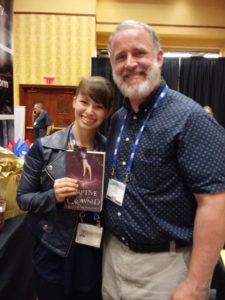
Elizabeth Newsom, her book in hand, taking a picture with me.
- A few of my fellow Realm Makers alumni were around. Amy Williams was actually on site for an AWSA conference, not CPE–note that AWSA has a specific mission of promoting female authors and speakers, but I saw Amy anyway. Tina Yeager was also there at the CPE and is with AWSA, though was promoting a non-speculative book. Among the Realmies I knew, only Elizabeth Newsom was there to promote a fantasy book.
- The expo was pretty huge. I didn’t get numbers of how many vendors attended, but they filled a large conference room. Certainly vendors of Christian books are not giving up on trying to sell items to independent Christian bookstores. So in that way, the market seems pretty robust. (Vendors with European accents were common enough–I had an interesting conversation with a Reformed book vendor from Scotland.)
- The conference center was nice, the food was great, and they even had entertainment Sunday and Monday nights (music, someone to share a message, and Christian comedians). Each day also had devotional/worship time. Pretty impressive. Obviously the Munce Group was making sure the bookstores are in the mood to buy products.
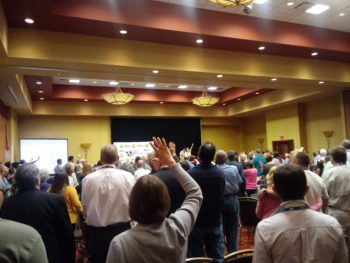
Sunday praise and worship at the CPE
- More and more books on theology and Christian living are by non-experts, by celebrities and whatnot (according to the market update). That may be a negative thing overall, but I’m thinking there may be an opportunity there for me to write or publish books that would interest me, which Christian bookstores would also be interested in.
- The Christian Indie Publishers Association (CIPA), who represented the two books I brought with me to the CPE (I paid them to do so) didn’t prove to be very speculative fiction-friendly. If you want details, contact me individually and I’ll share them. But while CIPA did get me into the Christian Products Expo, I would recommend a bit of caution if any other small Christian publisher who does speculative fiction is thinking about joining them.
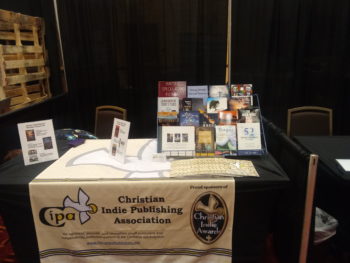
The CIPA table at the CPE, with two Bear Publications books in their book rack.
- Some training for authors on social media and email list building was included in the expo and was first-rate.
- I met some great authors (including Jay Payleitner, a bestselling author who was very impressed with Beatitudes and Woes) and important book sellers and distributors. I have no idea specifically what will come of all those contacts, but I’m glad I made them.
Anyway, this wraps up my report on what I saw, did, and what I think. I’d be happy to respond to any questions or comments you may have in the comment section below.






















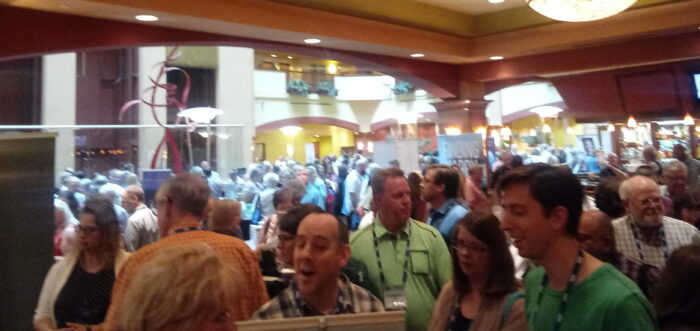








Thank you for your report. I especially appreciate “attending” vicariously through your experiences.
Thank you for delineating the “clearly identifiable as Christian” requirement of the book stores. I also go to a Christian Book Store for that purpose.
Thank you also for pointing out the danger of that label becoming too narrow to hold all the creativity that Christians produce. To me, that is a sign that the publishing industry is still wrestling with the changes the computer has brought to society, and while the wriggling and jiggling of positions occurs, there is hope for the best to fall into place!
I pray for my book to find its place, and you have prompted me to pray more specifically for the industry.
What’s your book about?
Years ago, the Christian book/gift shop in my area expanded, and I was disappointed to see that they didn’t expand the book section by much at all, but they made their selection of gifts and cards quite a bit larger, so what you said about Christian stores emphasizing gifts is true. The sad part for me is that I wanted to buy books from that store, rather than the secular book store that was in town at the time, but the Christian one didn’t really restock books often, if at all. Then again, I haven’t been there in a while, so maybe they changed that.
In one podcast I listened to, it talked about Bookstagramers, who, I guess, want to buy the nice looking hard cover editions of books. They arrange the books into a nice photoshoot and then post it on their Instagram. A lot of people now want to buy physical copies as collectors items, show pieces, etc. So a lot of indie marketing around physical books seems to make use of that.
There’s a lot of other upcoming trends that are coming to disrupt every corner of publishing, so in some ways I would personally be hesitant to start a physical bookstore until I have a better idea of how things will turn out(not saying I’ll ever start a physical book store, just giving my impression as someone from my age group) I think there’s going to be a market for print books for a long time, but it will change and I wouldn’t want to invest in something as expensive as a brick and mortar store unless I knew it was worthwhile and would be able to last for a long time.
You might find this interesting, if you haven’t seen it already. It discusses a lot of publishing potentialities a lot of people don’t bring up, including some implications for book translations and audio:
I wish I could come up with the wherewithall to bookstagram our books. I’m thinking the 80+ illustrations in our book coupled with the fact that most young things read on their phones is why well over 80% of our sales are paperbacks. They want to see the pictures and have the arty cover available.
Ok, I listened to enough of the podcast to hear the nine points listed. I don’t think this use of AI will immediately impact Christian bookstores. They will be slow adopters of this kind of thing–non-fiction will have to be at least assigned to a human being with the claim it came from a human being before Christian book buyers will be interested.
Of course as the publishing industry changes to produce books in “micro print on demand,” this will effect the books available to Christian bookstores. Some of them may choose to print books for people on demand themselves rather than order them from a distributor.
But as long as people want print books and want to see their print books prior to buying them, there will be a place for brick and mortar stores. And as long as there are brick and mortar stores, people, at least some of them, will want to go to expos to physically see books (and other products) before buying them.
Eh, yeah, I don’t think these things are going to be a huge immediate impact. I think seeing these things on the horizon is important, though, in terms of either weathering the future storms of change or finding ways to use them to one’s advantage.
The idea of book stores having book making machines in the back is pretty cool and interesting, though. It would basically make bookstores like a McDonalds for books. But then it would probably make it where it’s easy for people to actually pirate paperbacks, so rights management tools would have to change a bit probably.
Agreed!
Because you’re not from the Bible Belt, you may or may not realize that the real target audience for Christian stuff stores is middle-aged ladies. They probably have kids’ stuff and a few enterprising ones might have some Christian rock CD’s for the teenagers with occasional pocket money. But most of the real money spent in these stories is from middle-ages ladies, the Keepers of Civilization but also the Keepers of Tacky Kitsch (bless their hearts). It disseminates from there when all the moms of young children with no money buy their castoff Live Laugh Love signs at thrift shops.
Maybe it’s because I have delusions of snobbery beyond my status as a common plebe, but I really do not understand paying 50 smacks at Hobby Lobby for cheapa** Chinese particle-board copy of “Live Laugh Love” in leopard-printed script font. Is our trade deficit really worth THAT?
But they probably consider me uncivilized because my dinnerware doesn’t match.
With future Christian(and I guess even secular publishing) a lot of the answer probably lies in people writing/publishing the type of books they want to read. And I think eventually younger people will start opening little stores that they know will cater to younger people instead of just the middle aged ladies you mentioned.
I have heard it mentioned before (by Jeff Gerke) that the middle aged ladies just aren’t interested in speculative fiction and that’s why such stores will never carry much speculative fiction.
But I have drawn a separate conclusion, one that I honestly cannot prove is true–that in fact the middle aged women WOULD possibly buy speculative fiction if they were 100% positive it were Christian or directly related to Christian issues. Because those women want to give gifts to their kids and family and might buy something speculative–but they’d have to be fully convinced the thing they buy is Christian in content. (They have zero tolerance for stealthy support of non-Christian ideas.)
I think I can do that. I might be wrong, but I think I can. I think other Christians can do it too, but it would take time and patience to make it happen…
(We shall see if I’m right.)
This is at least partly true — my mom will buy sci-fi for my young teen brother if it has the Focus on the Family branding (I’m thinking of Brock Eastman’s Quest for Truth series, and I think there was another series that had Mars in the title). She’ll also buy things from Christian Books online.
Why would they buy edgy fiction they don’t understand nor approve of when they can buy their grandchildren bland devotionals with trendy graphic design?
(I am SUPREMELY skeptical about this market’s capacity to change in any significant manner)
Well, it’s already gone through changes and will continue changing as time goes on. Christian fantasy was pretty much not a thing at all at one point, for instance, but people like Bryan Davis have already paved the way for more changes in the future. He sells at lots of homeschool conventions every year, and even has novels for adults that deal with heavier topics and content(like human trafficking).
For your crocheting…do you sell/market based off of the crocheted items being sort of personalized/customized? People are more willing to pay for stuff if they see it as a more unique item.
Certainly some people do custom or commissioned work, like my coworker who is funding his scarf/hat yarn habit that way. But it has its own pains in the butt. Do not want.
From my experience with the Realm Makers mobile bookstore, adults will buy SF for kids — especially teen boys — because they’ve learned that forcing kids to read stuff they hate produces kids who hate to read. The adults would rather foster the love of reading than avoid fiction they don’t personally enjoy. Those adults who don’t read SF themselves, they rely on the retailer to vet the Christian-ness of the content.
That said, you’re not wrong to be skeptical. The RMMB has faced plenty of obstacles. But it is making inroads.
Has RMMB actually appeared at the Munce Group-led CPE? Or did it go to the CBA conference before that closed down? I’m curious.
Middle-aged lady here! While there’s truth to the buying habits of middle-aged women, especially Christian women, there’re also many of us who grew up on sci-fi/fantasy. We found so little of it in the Christian market for so long, we gave up looking for it there. This is where the indie/small-press market is key, and where many, such as myself, have found the books we’ve been longing for. This is why Realm Makers was such a God-send for me, both as a Christian reader and writer of spec-fic.
YES! As a middle-aged [truthfully? Older than that!] lady who grew up reading classic SF (Asimov, Heinlein, Pohl, Gordon Dickson, Poul Anderson, James Schmitz, Randal Garrett, etc), I LOVED discovering Christian spec fiction!
In fact, for several years I produced a monthly Christian fiction page for the specialized webpage on our county library’s catalog. I also suggested Christian fiction titles for our book selection people to purchase for the system. I worked with all types of Christian fiction but did my best to feature spec fiction. I really miss doing that page now that I’m retired! [sigh]
Andra — right there with you! I stopped shopping for fiction at my local Christian bookstore because they either didn’t have SF or the few MLP/Enclave titles they had I had already read.
That’s what makes writing dark biblical fiction with a hefty dose of violence and no promise of happy endings or easy romance hard to sell (especially when you add in sci-fi/fantasy elements). It’s also why the books that sell consistently well in Christian fiction are thinly veiled, puritan versions of smutty romance (no explicit sex scenes). Someone quite close to me laughed when looking at one of the most popular Christian fiction writers and said, “Every book has a ‘hot’ young guy on it and a title like, ‘Rescue Me.’ This is marketed to horny old Evangelical ladies.” I have to say… I see her point. That’s no statement on the quality of the writing of those books. Only pointing out some of the market forces at work here. Middle-aged Evangelicals tend to want things that make them feel good/comfortable. That’s why they buy Live Laugh Love signs. If you don’t sell what they’re looking for, you won’t find success in the traditional channels for Christian fic. The only speculative fiction that finds success with them is speculative fiction they think will serve as “spiritual formation.” So, basically, I’m agreeing with both you and Travis.
I’ve been fortunate to have some mild success writing in a tiny niche and pulling a good income from it. But I’ve had to make adjustments to fit the market a bit better.
It’s mostly why I don’t have an etsy store for my crafting. 1) No one wants to pay what it costs for my materials, skill, and time when they can buy a 10 dollar version at Wally World. 2) I would get sick to death of constantly making duplicates of things that DO sell.
Could you talk more about your niche, Brennan? I’m curious.
You want an explanation of the content and focus of the books? Or who the readership is?
Is it a technical niche?
Depends on how you define “technical niche.”
Well, quit being sly and spill it, silly beans.
It occurred to me after an embarrassing long time I can Google your stuff, but that alone doesn’t describe your target market
Sorry, I didn’t think you were legitimately curious. My bad!
I started out writing fantasy inspired by biblical text. My target market was fans of dark Christian fantasy who liked dense symbolism and lyrical writing (good luck finding them). The people who bought it were fans of biblical fiction. Needless to say, that didn’t work out well. Got a decent chunk of “blasphemy – 1 star” reviews, which is ironic because I’m ridiculously “orthodox.” Shifted the focus in the next books to be more straightforward biblical fiction, but couldn’t stop injecting magic realism. The new ones went over well, though, so I settled on “Epic imaginative biblical fiction.” Dark, fast-paced, lyrical biblical fiction (big scope) with elements of magic realism and a dash of romance to please biblical fiction fans. Basically, I’m selling to fans of fantasy and biblical fiction, but don’t fit squarely in either niche. Lorehaven reviewed FLOOD, my second book, and called it a “tour-de-force of character drama.” Hope that’s helpful…
I’m currently re-writing the first book, CAIN, to be the new style, rather than straight dark fantasy. Got the rights back from my publisher finally. That’ll be out in March, and will have a different title.
I guess I don’t know what “lyrical” is supposed to mean if it isn’t a euphemism for purple prose. But IIRC, you had a free ebook available, if that’s one of the ones in your adjusted style. Except I would probably feel obligated to send you a multi page document of my nitpicks.
No, the free ebook is a short story from a long time ago, not new in style. Lyrical means there’s attention paid to saying things beautifully. Only an inexperienced writer thinks that lyrical always = purple. If you’re going to read any of the books, I’d suggest reading FLOOD. Nitpicks are pointless unless they’re sent before publication. I pay for plenty good editing. Way more than most indy authors. And really, if you published something yourself, it would cure you a bit of the need to nitpick everything (I’m assuming, here, that you haven’t received much in the way of consistent feedback from other authors/the general reading population). But by way of illustration, here’s part of the beginning of FLOOD, to give you a taste of the style. It’s of Noah’s mother before she met his father. The first scene is of her family being murdered and her being sold into slavery:
Adah straightened to match her father’s stare. “Tell me why I cannot choose whom I might marry.”
Father ducked past the central beam that held their farmhouse aloft and stepped near. “Because I will not have you dishonor the family by marrying a fool.” His head tipped like a boulder on cliff shoulders, and Adah waited for what would surely come tumbling out of his mouth.
“Irad,” Mother warned as she stood against the wall kneading dough on the only table in their living room. Her shadow stretched double in the light of the candles that burned on the opposite side of the room, the flickering silhouette mirroring Adah’s father in size and shape.
“Lenah,” Father mocked, not looking from Adah. “Don’t say my name like an obscenity. Our daughter is throwing away our lives, the labor of our ancestors. The stress will be the death of me.”
Mother dusted her hands so the dough wouldn’t stick. “You are fine.” The table’s legs danced on the packed dirt floor as the weight shifted.
Well, I’m good with the idea of dark fantasy and dark biblical fiction :p
The kids’ stuff at those stores is rarely being bought BY the kids so much as it is being bought FOR the kids by middle-aged ladies. Speaking from experience here. (Although I do not now and never will own a “live laugh love” sign, and my dinnerware doesn’t match, either.) 😀
[LOL at “leopard-printed script font”. Nailed it.]
Great article. Thanks for sharing your experience and impressions. On the expo repaying attendees their travel and stay expenses, I do not think this is normal in other places. I work for a small table top game and comic book store and my bosses will go to trade shows. They have never mentioned being reimbursed for attending and they will talk about the business side of things with me on occasion. In fact, they won’t always go every year because of the expense of travel and lodging. Just a little note from another specialty industry.
I’ve noticed the decline in Christian stores. When I was young, there were 3 or more stores within driving distance from my house that I could visit. I loved going to them. But, over time, they have slowly disappeared to the point the only Christian store that I can drive to is the Catholic bookstore about 30 or more minutes away. They carry a lot of great stuff and I love to visit them but they don’t carry a lot of fiction so I do most of my buying of Christian fiction online at Amazon or directly from the author. Looking through the shelves is how I found new authors and books and was able to get the one I wanted without having to wait for it to ship. I miss the Christian bookstore and hope they grow again to at least the point there is one or two I can drive to.
Again, thanks for the article. It was some great insight.
Thank you!